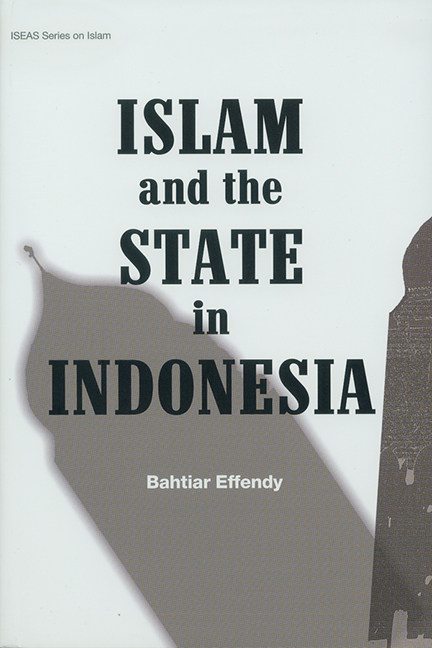Book contents
- Frontmatter
- Dedication
- Contents
- Abbreviations
- Acknowledgements
- Chapter 1 Introduction: The Problem of Political Relationship between Islam and the State
- Chapter 2 Explaining the Uneasy Relationship: Political Antagonism between Islam and the State in Indonesia
- Chapter 3 Emergence of the New Islamic Intellectualism: Three Schools of Thought
- Chapter 4 Implications of the New Islamic Intellectualism: Ideas and Practices
- Chapter 5 Beyond Parties and Parliament: Reassessing the Political Approach of Islam
- Chapter 6 Reducing Hostility: The Accommodative Responses of the State
- Chapter 7 Conclusion: Towards an Integrated Political Relationship between Islam and the State
- Chapter 8 Political Islam in Post-Soeharto Indonesia: A Postscript
- Bibliography
- Index
- About the Author
Chapter 1 - Introduction: The Problem of Political Relationship between Islam and the State
Published online by Cambridge University Press: 21 October 2015
- Frontmatter
- Dedication
- Contents
- Abbreviations
- Acknowledgements
- Chapter 1 Introduction: The Problem of Political Relationship between Islam and the State
- Chapter 2 Explaining the Uneasy Relationship: Political Antagonism between Islam and the State in Indonesia
- Chapter 3 Emergence of the New Islamic Intellectualism: Three Schools of Thought
- Chapter 4 Implications of the New Islamic Intellectualism: Ideas and Practices
- Chapter 5 Beyond Parties and Parliament: Reassessing the Political Approach of Islam
- Chapter 6 Reducing Hostility: The Accommodative Responses of the State
- Chapter 7 Conclusion: Towards an Integrated Political Relationship between Islam and the State
- Chapter 8 Political Islam in Post-Soeharto Indonesia: A Postscript
- Bibliography
- Index
- About the Author
Summary
To say that Islam deals with the spiritual life, with no interference in society and the state, may be as far from reality as saying that Islam provides a comprehensive and detailed social, economic and political system. The law of Islam, shari'a, in its two divine sources — the Qur'an and the Sunnah, the verbal and practical traditions of the Prophet — is permanent, but its direct legal rules are limited; at the same time, the intellectual derivatives (as represented in the voluminous jurisprudential works) and the accumulated practical behaviour of Muslim societies during successive centuries in different places (as represented in historical records) are changeable and extensive. Both parts are sometimes mixed and confused, not only in the view of some non-Muslim observers and scholars, but also in the view of some enthusiastic Islamic propagators.
Fathi OsmanSince the unravelling of Western colonialism in the mid-twentieth century, Muslim countries (for example, Turkey, Egypt, Sudan, Morocco, Pakistan, Malaysia, and Algeria) have experienced difficulties in attempting to establish a viable synthesis between Islamic political movements and ideas and the state in their respective localities. In these countries the political relationship between Islam and the state has been characterized by severe tensions, if not hostilities. Given the preponderant position of Islam in these regions, that is, being the religion of the majority of their inhabitants, this is indeed a puzzling reality. As such it has attracted many students of political Islam to raise the question as to whether or not Islam is actually compatible with a modern political system, in which the idea of the nation state serves as a major ingredient.
In Indonesia Islam has long been at an impasse in terms of its political relationship with the state. The regimes of both Presidents Soekarno and Soeharto regarded political parties based on Islam as potential power contenders capable of undermining the nationalist basis of the state. Primarily because of this, both the regimes worked to contain and “domesticate” the Islamic parties. As a result, not only did the leaders and activists of political Islam fail to make Islam the state ideology and religion in 1945 (on the eve of Indonesia's independence) and again in the late 1950s (during the Constituent Assembly debates over Indonesia's constitutional future), but they also found themselves repeatedly labelled “minorities” or “outsiders”.
- Type
- Chapter
- Information
- Islam and the State in Indonesia , pp. 1 - 12Publisher: ISEAS–Yusof Ishak InstitutePrint publication year: 2003

